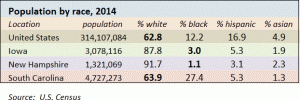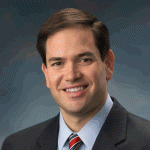![]() By Andy Brack, editor and publisher | South Carolina will play the role of political legitimizer in its presidential primaries later this month. It may not anoint the next president, but it certainly will declutter the field.
By Andy Brack, editor and publisher | South Carolina will play the role of political legitimizer in its presidential primaries later this month. It may not anoint the next president, but it certainly will declutter the field.
Why? Because South Carolina looks like more of the rest of America, compared to contests in Iowa and New Hampshire where nine in 10 people are white. In South Carolina, just like the rest of the country, six in 10 people are white. Bottom line: Because South Carolina’s culture isn’t so homogeneous, there’s a greater diversity of views and values. And that may lead to more traditional politics.
 On the Democratic side, voters head to the polls Feb. 27 to pick between former Secretary of State Hillary Clinton and U.S. Sen. Bernie Sanders. With the contest close in Iowa and with Sanders expected to do well in New Hampshire, which is next door to his home state of Vermont, the media will try to make a horse race of the contest as it heads South. Expect to see stories about how Clinton’s campaign is in turmoil and all sorts of other nonsense.
On the Democratic side, voters head to the polls Feb. 27 to pick between former Secretary of State Hillary Clinton and U.S. Sen. Bernie Sanders. With the contest close in Iowa and with Sanders expected to do well in New Hampshire, which is next door to his home state of Vermont, the media will try to make a horse race of the contest as it heads South. Expect to see stories about how Clinton’s campaign is in turmoil and all sorts of other nonsense.

Clinton
Don’t believe any of it. South Carolina is Clinton Country for Democrats. African Americans make up about half of the primary electorate and they won’t vote in droves for Sanders, in part because of his own characterization as a “democratic socialist.” Black voters are much more conservative than many people think and they’ll stick to the mainstream candidate of the establishment — Clinton. Besides, lots of South Carolina Democrats still like her husband, Bill, the former president.
The Republican contest on Feb. 20 is more up in the air. U.S. Sen. Ted Cruz of Texas got a big bounce out of Iowa. It looks like Donald Trump, who still tops polls in South Carolina, may be losing a little steam in New Hampshire, but he’s still popular here. Some things to consider:
Non-establishment beat establishment. If you combine the votes of Cruz and Trump, a majority of Iowa’s GOP caucus-goers voted for non-establishment candidates. That’s certain to be scaring the GOP establishment, which is likely now plotting ways to bolster candidates like U.S. Sen. Marco Rubio, who did better than expected in Iowa.
Trump didn’t lose the Iowa caucuses. Despite the presidential punditry pack proclaiming Trump’s second-place finish was a loss, he didn’t lose Iowa. In fact for as little time as he spent there, getting 24 percent of the electorate and coming in second sounds like he did pretty well. Cruz did a little better — 28 points — but he spent lots of resources and time in Iowa. Yes, Cruz got a bounce, but his support overall isn’t as strong as Iowa and the media might make it seem.
TrusTed. Over the years, we’ve learned that anytime a politician tells a voter, “Trust me,” there might be a pretty good reason to do just the opposite. Cruz’s new slogan falls into this category. Remember, he’s a guy who complained about where President Barack Obama was born (Hawaii) when Cruz wasn’t even born in the U.S.

Rubio
Rubio’s support is broad. The primary stars seem to be aligning for Rubio, who seems well-positioned in New Hampshire. We’re told by insiders that when GOP voters across the spectrum are asked which candidate is acceptable as a second choice, Rubio is the consensus pick. That means he is generally acceptable from Christian evangelicals to more moderate country-club Republicans. If he can come into South Carolina and unite the establishment — which he is doing with high-profile endorsements by U.S. Sen. Tim Scott and U.S. Rep. Trey Gowdy — he may emerge after South Carolina as the establishment Republican to beat.
[Editor’s note: Rubio’s Saturday night debate performance in New Hampshire was widely panned, which may be an opening for other candidates to surge through, making the prediction below from Friday’s Statehouse Report a little less reliable, but still possible.]
Our prediction for November 2016: Clinton versus Rubio. But there’s something that’s still up in the air — the impact of any major third-party candidacy. Trump could decide to make a bid and so could another billionaire — former New York City Mayor Michael Bloomberg.
Republicans will have a stronger ticket if the nominee picks a moderate like Ohio Gov. John Kasich. And that would be smart too — because Rubio and Ohio come from big swing states, Florida and Ohio, that have helped Democrats recently.



 We Can Do Better, South Carolina!
We Can Do Better, South Carolina!
























